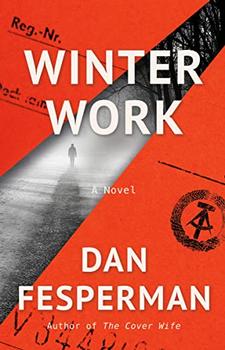Summary | Excerpt | Reviews | Beyond the Book | Readalikes | Genres & Themes | Author Bio

A novel
by Dan Fesperman1
February 1990
In winter, the forest bares its secrets. Hill and vale are revealed through disrobing trees. Mud and bone arise from dying weeds. Woodpeckers, taking notice, pry deeper on leafless limbs and rotting logs. Their drumbeat goes out like a warning.
Emil Grimm, out for a morning walk, exulted in all of it. Being a German of a certain age, he loved getting into the woods, and as a professional keeper of secrets he was impressed by any display of full disclosure.
The trouble was that this year's unveiling hadn't confined itself to the trees. His employer—indeed, his country—was being stripped as bare of its cloaking as the oaks and beeches. All because a concrete wall in Berlin had been knocked to the ground a few months earlier, a shocking act of defiance that had set people loose in ways forbidden for nearly thirty years.
Freedom of movement was fine by Emil. Long overdue, in fact. But the attendant bustle and bother were letting light and air into places not built to withstand scrutiny. Inquisitive people had begun unlocking cabinets and closets that, for good reason, had long remained undisturbed.
Soon enough, Emil, too, would be flushed from cover. In a few weeks he would receive his last paycheck from the HVA, the foreign intelligence service of the Ministry of State Security, or Stasi, as everyone now seemed to be calling it. Weeks earlier, the ministry's headquarters complex—five city blocks of hulking gray buildings—had been emptied of its seven thousand employees, Emil among them. He wasn't even allowed back in to clean out his desk.
Protesters had already ransacked one building, tossing documents out the window like ticker tape for a capitalist parade until police finally intervened. Foreign intelligence services, friendly and hostile, were eagerly lining up for a look at the leftovers. Some were offering money for the slightest glimpse.
Just thinking about it made Emil queasy. Certain secrets had always been toxic in the German Democratic Republic. Turn them loose now, with the two Germanies preparing to reunite, and there was no telling what might climb off the pages. Figuratively speaking, a plague was at hand, with no cure available. Although Emil was working on that.
He had other worries, too. In the West German capital of Bonn there was talk of prosecuting the East German spymasters who had outwitted them for years. Treason, they were calling it, as if East Germany had never existed as a separate nation. Emil's name was said to be high on the list of targets, and at the age of fifty-seven prison was an especially daunting prospect. As borders were opening for his countrymen, his were closing. Should he flee? Hire a lawyer? Go into hiding?
In the meantime, he had taken refuge with his wife at their woodland dacha north of Berlin, near the rural village of Prenden, where an hour ago he had set out on his favorite trail. It looped uphill along a mossy path before descending through beeches to a loamy circuit of a small, pretty lake, the Bauersee. His plan was the same as on every other morning: Clear his head by listening to the birds as they reported in from their dawn patrols; keep an eye out for fox, deer, and boar. Breathe deeply, stretch his legs, find out what had happened overnight. Nature was the only realm still offering free rein to his curiosity.
But as Emil began his descent he realized that even this frontier was now at risk of closure. The voices were the first sign—a grim mutter of officious males, punctuated by bursts of static from a walkie-talkie. He paused on the hillside to listen, breath misting, nose running, right knee aching from an old injury best left unexplained.
Peering through the branches toward the lakeshore, forty yards downhill, he saw a cordon of yellow plastic tape. Near it were three men in dark greatcoats—no, four—moving to and fro like foraging ravens. The overcast lighting of a forty-watt sun turned them into silhouettes, but the gloomiest sight was the body that lay among them at the water's edge, a man's, sprawled facedown across tree roots glassy with ice.
Excerpted from Winter Work by Dan Fesperman. Copyright © 2022 by Dan Fesperman. All rights reserved. No part of this excerpt may be reproduced or reprinted without permission in writing from the publisher.
I write to add to the beauty that now belongs to me
Click Here to find out who said this, as well as discovering other famous literary quotes!
Your guide toexceptional books
BookBrowse seeks out and recommends the best in contemporary fiction and nonfiction—books that not only engage and entertain but also deepen our understanding of ourselves and the world around us.